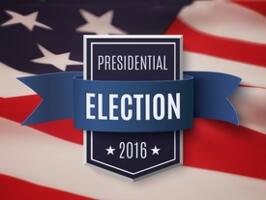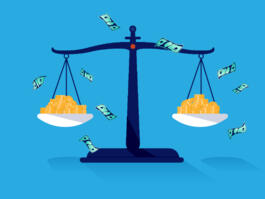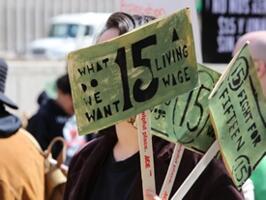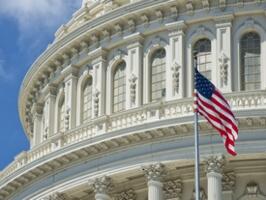Voters Think Trump Would Be Better for Economy - Or Would He?
The U.S. economy historically has had an average growth rate of 3.3% but has fallen short of that number in every year of Barack Obama’s presidency. Still, his fellow Democrats give the president positive marks for his economic performance and think Hillary Clinton would do more of the same. Donald Trump, on the other hand, is expected to make the economy better by all voters - except Democrats.
Seventy-five percent (75%) of all Likely U.S. Voters rate the issue of the economy as Very Important to their vote in the upcoming presidential election, according to a new Rasmussen Reports telephone and online survey. Another 20% say it’s at least somewhat important to how they will vote. Just four percent (4%) describe the economy as not very or Not At All Important. (To see survey question wording, click here.)
Forty-two percent (42%) say Obama has done a good or excellent job handling the economy, while 43% think his economic performance has been poor. This is a slightly more positive assessment than we found in January but is generally in line with regular findings since 2014.
Only 12% of voters think Clinton would do a better job economically if elected president, compared to 42% who expect a better economic performance from Trump. Yet while 29% say Clinton would do worse than Obama, 43% believe Trump would do worse. Half (49%) expect Clinton to do about the same as Obama. Just seven percent (7%) say the billionaire businessman would handle the economy the way the current president has.
Drill down, though, and you find that while only 19% of Democrats think Clinton would do a better job with the economy than Obama has, 74% of Republicans and a plurality (43%) of unaffiliateds believe Trump would do better. Of course, 76% of Democrats say Trump would do worse. Roughly half of voters in all three groups feel that Clinton would do about the same as Obama.
(Want a free daily e-mail update? If it's in the news, it's in our polls). Rasmussen Reports updates are also available on Twitter or Facebook.
The survey of 1,000 Likely Voters was conducted on May 17-18, 2016 by Rasmussen Reports. The margin of sampling error is +/- 3 percentage points with a 95% level of confidence. Field work for all Rasmussen Reports surveys is conducted by Pulse Opinion Research, LLC. See methodology.
Trump has now grown his lead over Clinton in Rasmussen Reports’ first weekly White House Watch survey.
These findings rating the potential performance of Clinton vs. Trump on the economy are in line with surveys Rasmussen Reports has done on other issues, including national security, diplomacy, illegal immigration and the selection of the next justice to the U.S. Supreme Court. Republicans firmly believe Trump will do better, and unaffiliated voters tend to agree. Democrats feel strongly that Trump will do worse and don’t expect any major changes if Clinton is the next president.
Among voters who rate the economy as Very Important to their vote, 47% say Obama has done a poor job handling the issue; 38% give the president positive marks in this area. Forty-eight percent (48%) of these voters think Clinton would do about the same, while 47% say Trump would do better.
Most voters who say the president has done a good or excellent job with the economy expect Clinton to do about the same. Among voters who rate Obama’s economic performance as poor, 83% say Trump would do better; 45% say Clinton would do worse, while 48% think she would perform about the same.
Voter of all ages consider the economy a Very Important voting issue, but those under 40 are much more likely than their elders to approve of the job Obama is doing. Older voters think Trump would do a better job; most younger voters feel he would do worse. All tend to agree Clinton is more likely to do more of the same.
Just 27% of all voters think the country is headed in the right direction.
Forty-four percent (44%) describe themselves as conservative when it comes to fiscal issues such as taxes, government spending and business regulation. Nearly as many (41%) say they are moderates in this area, but only 13% consider themselves fiscal liberals.
Most voters still believe the U.S. economy is unfair to the middle class. But voters say that economic growth is more important than economic fairness, and they give a thumbs up to policies that expand the economy over policies that promote fairness.
For Republicans, government is a problem; for Democrats, it’s the solution.
Democrats are more supportive of raising the minimum wage than Republicans are.
Additional information from this survey and a full demographic breakdown are available to Platinum Members only.
Please sign up for the Rasmussen Reports daily e-mail update (it's free) or follow us on Twitter orFacebook. Let us keep you up to date with the latest public opinion news.
The survey of 1,000 Likely Voters was conducted on May 17-18, 2016 by Rasmussen Reports. The margin of sampling error is +/- 3 percentage points with a 95% level of confidence. Field work for all Rasmussen Reports surveys is conducted by Pulse Opinion Research, LLC. See methodology.
Rasmussen Reports is a media company specializing in the collection, publication and distribution of public opinion information.
We conduct public opinion polls on a variety of topics to inform our audience on events in the news and other topics of interest. To ensure editorial control and independence, we pay for the polls ourselves and generate revenue through the sale of subscriptions, sponsorships, and advertising. Nightly polling on politics, business and lifestyle topics provides the content to update the Rasmussen Reports web site many times each day. If it's in the news, it's in our polls. Additionally, the data drives a daily update newsletter and various media outlets across the country.
Some information, including the Rasmussen Reports daily Presidential Tracking Poll and commentaries are available for free to the general public. Subscriptions are available for $4.95 a month or 34.95 a year that provide subscribers with exclusive access to more than 20 stories per week on upcoming elections, consumer confidence, and issues that affect us all. For those who are really into the numbers, Platinum Members can review demographic crosstabs and a full history of our data.
To learn more about our methodology, click here.





